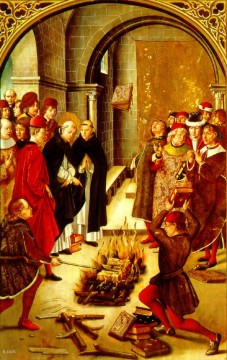| The
persecution of heresy by the courts of the church. |
 |
|
The
burning of books
|
The early church
generally judged heresy through councils or synods and punished it with
excommunication. After the time of Constantine,
secular Christian princes were regularly called on by the church to execute
heretics and confiscate their goods. The Emperor Frederick II organized
an inquisition to hunt out heretics in 1232, but this function was quickly
claimed for the church by Pope Gregory IX. Inquisitors heard the cases
of those accused of heresy, often with the assistance of a jury of lay
and clerical members. Those accused who confessed were typically received
again into the church after penance. Those who refused to confess and
were found guilty suffered penalties of varying severity. Those among
the condemned who were handed over to the secular authorities were usually
burned at the stake. The Spanish Inquisition varied from the general European
pattern. It was largely a function of the Spanish state and noted for
its severity. It was not dismantled until the nineteenth century.
|